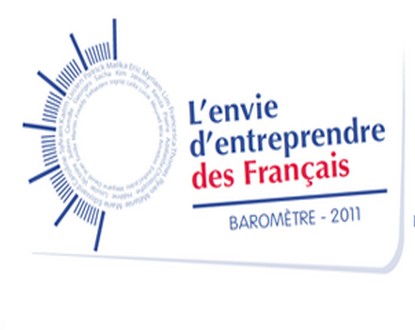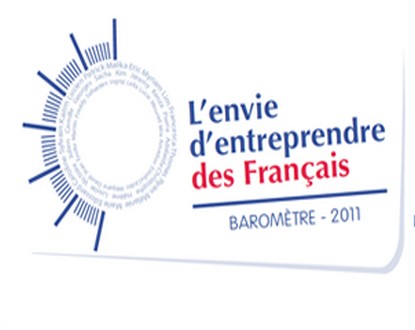Job creation will be a major theme of the presidential and legislative elections of 2012. However, to create jobs, entrepreneurs must be cultivated. In this context of systemic financial crisis, SMEs and the real economy are more than ever the engine of France’s economic growth and employment. As a reminder, SMEs have created 2.3 out of the 2.8 million jobs over the past 20 years.
 The association Créativallée, under its program Donner Envie d’Entreprendre, has designed a barometer examining French people’s desire to become entrepreneurs, representing the 22 regions of metropolitan France.
The association Créativallée, under its program Donner Envie d’Entreprendre, has designed a barometer examining French people’s desire to become entrepreneurs, representing the 22 regions of metropolitan France.
“The French Desire to Become Entrepreneurs” aims to also be the focal point for medium and small businesses, employers’ associations, academics, economic development institutions, support and guidance networks for business creation, project bearers, and aspiring entrepreneurs—to support and develop the desire to undertake entrepreneurial ventures in France.
The 12-question survey defined by Donner Envie d’Entreprendre and its partners tested the French on three topics.
- the perception of business creation and takeover
- business projects, barriers, and incentives
-
the image of the entrepreneur
THE RESULTS FROM THE REGIONAL TOUR
1. Personal fulfillment and independence top the terms associated with entrepreneurship, but a societal responsibility is barely perceived.
In French people’s minds, the key terms associated with creating or taking over a business are still and always personal fulfillment (43%), directly linked to concepts of autonomy and independence encapsulated in the phrase “being one’s own boss” (42%).
The common negative perceptions—financial and legal complications—are ranked low (10%).
Societal responsibility of the entrepreneur, the desire to contribute to regional development by creating or taking over a business, are weakly perceived: only 10% of respondents associate business creation or takeover with the desire to impact their environment, be it where they live or work.
Money, success, and adventure are not among the primary motivators linked with the desire to become an entrepreneur.
2. Financial assistance as a primary need; the entrepreneur faces themselves to successfully drive forward their project
The primary need: financial assistance, prioritized by more than half of the respondents. Then come considerations regarding personal resources and skills of the project bearer: courage and perseverance (45%), experience and know-how (37%), an original idea (35%).
Only 1/3 of respondents place support from business aid organizations and experts among the top three most important needs, and only 10% value support from active business leaders. Yet, the more an entrepreneur operates within a network, the more likely their business is to be sustainable.
3. Immediate integration versus progressive: French are divided on the importance of sustainable development in a business creation project
The French are split on the role of sustainable development. 41% of those surveyed would like to fully integrate it from the start of their project. 40% deem it better to gradually integrate this component.
4. Business creation: 14% of French people are certainly or probably ready to start a business within 3 years; under 35s lead with 23% intentions.
14% of French people are looking to create a business in the next three years, and 7% have a project to take over an existing activity. However, only 4% of respondents are certain they will create and 2% will take over a business in the three years following.
Recognizing the dynamism of their territory is also seen as an additional lever for entrepreneurial desire: the intention to create is 4 percentage points higher than the national average among respondents with a positive view of their territory (18%).
5. Barriers to business creation/takeover: Fear of change and the lack of entrepreneurial spirit as underlying factors
86% of French respondents do not have any project to create, and 93% none to take over a business in the next 3 years.
Among the main reasons cited for this lack of project, 48% highlight satisfaction with their current status as an employee or retiree. This is an indication of a certain fear of change and risk-taking. But is this fear circumstantial or cultural?
Cited to a lesser extent, other reasons include the significant financial risk (19%), lack of interest in business (12%), lack of entrepreneurial spirit (10%), administrative and legal complexity (5%).
6. Support from family and local economic dynamism, levers for the desire to become an entrepreneur
In the context of launching their own business (creation or takeover), nearly ¾ of French people (72%) consider they would be supported by their family and friends. However, disparities exist between French people with a creation or takeover project at 3 years and those certain not to have one. The former are 86% considering receiving support from their entourage versus 64% for the latter.
Only 50% of French people consider their region economically conducive to business creation/takeover; an optimistic perception among future creators/takers
Future creators or takers show much greater confidence in their region’s capacity to support their development (64%).
7. Almost recognized equality between men and women in the capacity to undertake, but inequalities persist
83% of French people believe that women have as many strengths as men in terms of risk management, personal ambition, and decision-making, to succeed in creating and managing a business, while 10% think they have more strengths—a good encouragement for female entrepreneurship.
However, figures confirm existing disparities in creation/takeover: women represent 28% of business creators in France.
8. Perception of young businesses: a socially and environmentally responsible approach recognized by the French…
Contributing to the economic attractiveness of their territory, positive image of business leaders, job creation, or environmental preservation… the social and environmental responsibility of young businesses is widely recognized by the French.
77% of respondents believe that young businesses contribute a lot or sufficiently to the economic attractiveness of their region. 75% consider they participate in a good image of business leaders. 62% believe they contribute to job creation, and 57% to environmental preservation.
9. SMEs insufficiently relayed by opinion leaders
Regardless of regions, socio-professional categories, or respondents’ ages, a significant majority of French people (84%) claim that opinion leaders such as the media and elected officials do not discuss young businesses enough.



